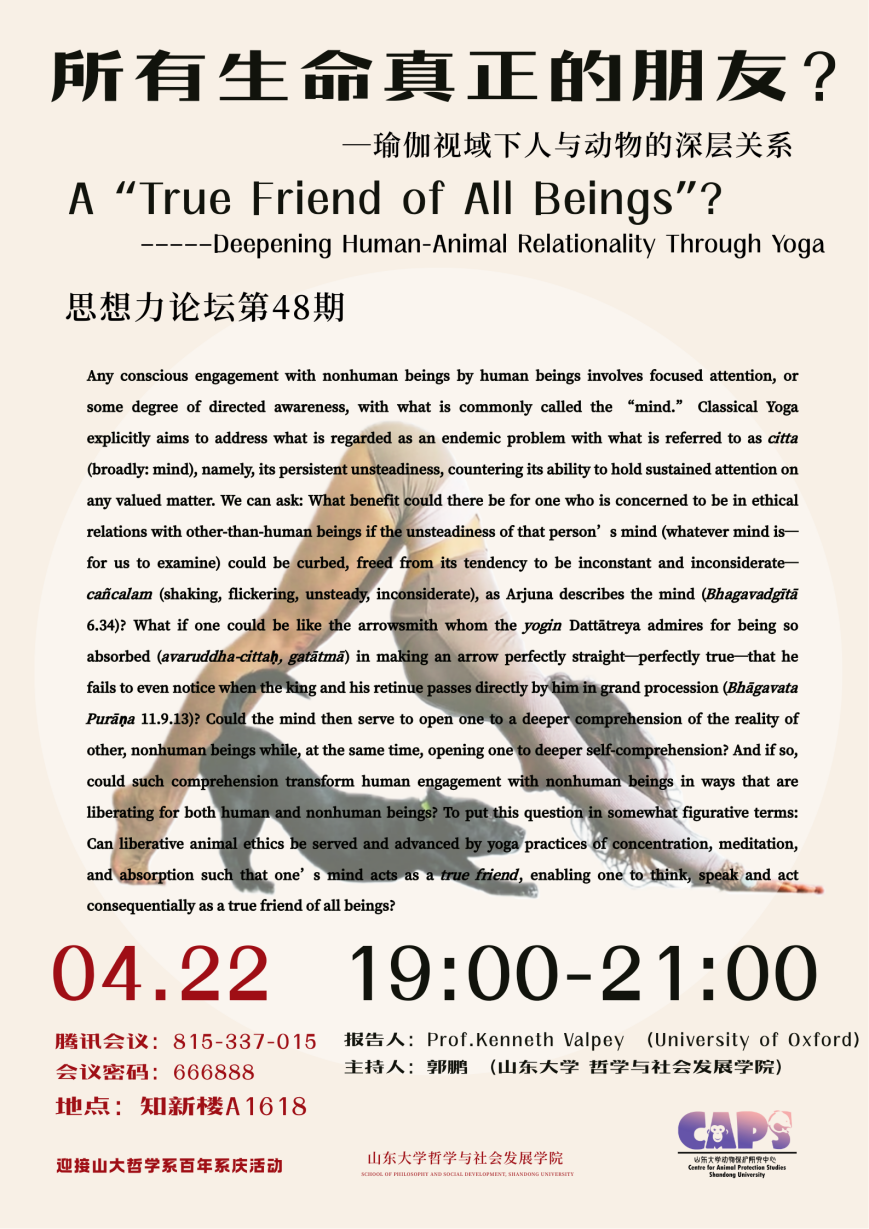讲座主题:
所有生命真正的朋友?
——瑜伽视域下人与动物的深层关系
摘要:
人类与非人类生命之间任何有意识的接触都涉及到集中注意力,或某种程度的定向意识,通常被称为“心智(mind)”。古典瑜伽直指心智,旨在解决与心智相关的一个普遍性问题,即持续的不稳定状态削减了它自身在任何有价值的事情上保持持续专注的能力。我们不禁要问:倘若一个人心智的不稳定性能够得到控制,摆脱其变化无常、鲁莽轻率和不顾别人的倾向——正如《薄伽梵歌》6.34中阿周那所描述的—那么对于关心与非人类生命建立伦理关系的人来说,会有何益处?倘若一个人能像瑜伽行者达塔特雷亚(Dattātreya)所钦佩的箭匠那样,全神贯注于将箭做得笔笔真真且完美无瑕,以至于当国王及其随从盛大列队从他身边经过时,他甚至都没有注意到(《薄伽梵往世书》11.9.13),那又会怎样呢?那时,心智是否能够帮助一个人更深入地理解其他非人类生命的真实情形,同时也让一个人更深入地理解自我?如果是这样,这种理解能否以对人类和非人类生命都具有解放意义的方式改善人类与非人类生命之间的接触?本次报告将探讨上述问题,认为通过全神贯注的瑜伽练习,一个人的心智会像一个真正的朋友那样发挥作用,使人能够作为所有生命的真正朋友进行思考、说话和行动,从而服务和推进解放性的动物伦理。
Lecture Title: A “True Friend of All Beings”? Deepening Human-Animal Relationality Through Yoga
Any conscious engagement with nonhuman beings by human beings involves focused attention, or some degree of directed awareness, with what is commonly called the “mind.” Classical Yoga explicitly aims to address what is regarded as an endemic problem with what is referred to as citta (broadly: mind), namely, its persistent unsteadiness, countering its ability to hold sustained attention on any valued matter. We can ask: What benefit could there be for one who is concerned to be in ethical relations with other-than-human beings if the unsteadiness of that person’s mind (whatever mind is—for us to examine) could be curbed, freed from its tendency to be inconstant and inconsiderate—cañcalam (shaking, flickering, unsteady, inconsiderate), as Arjuna describes the mind (Bhagavadgītā 6.34)? What if one could be like the arrowsmith whom the yogin Dattātreya admires for being so absorbed (avaruddha-cittaḥ, gatātmā) in making an arrow perfectly straight—perfectly true—that he fails to even notice when the king and his retinue passes directly by him in grand procession (Bhāgavata Purāṇa 11.9.13)? Could the mind then serve to open one to a deeper comprehension of the reality of other, nonhuman beings while, at the same time, opening one to deeper self-comprehension? And if so, could such comprehension transform human engagement with nonhuman beings in ways that are liberating for both human and nonhuman beings? To put this question in somewhat figurative terms: Can liberative animal ethics be served and advanced by yoga practices of concentration, meditation, and absorption such that one’s mind acts as a true friend, enabling one to think, speak and act consequentially as a true friend of all beings?
个人简介:甘立夫(Kenneth Valpey)博士,牛津大学博士,牛津大学印度学、动物伦理学研究中心终身研究员,梵文学者,翻译家。研究方向为梵文、瑜伽哲学、中印文化比较研究等,涉及语言学、翻译学、哲学、伦理学、人类学等多个领域。甘立夫博士周游列国,先后在美国哈佛大学、香港中文大学、北京大学、清华大学、中国社会科学院等高等学府及科研机构讲学等地授课、演讲,让听众从不同角度认识印度源远流长的文化和智慧。在过去四十年中,甘教授一直在研究、写作和阐述古印度瑜伽传统和相关梵文文献,尤其致力于通过恢复古老的价值观,并将其运用于现代社会,从而探索瑜伽理论和实践如何可能有助于促成一个更美好的现实世界。


